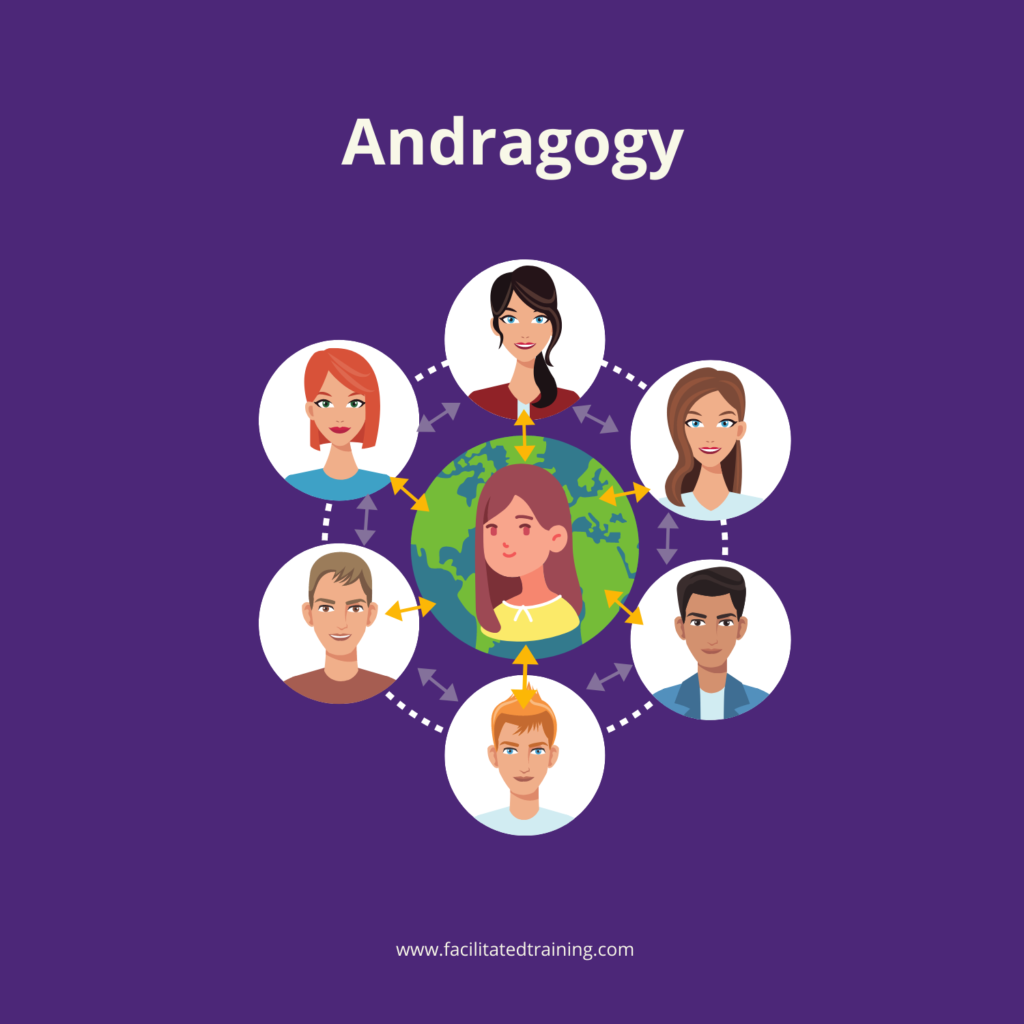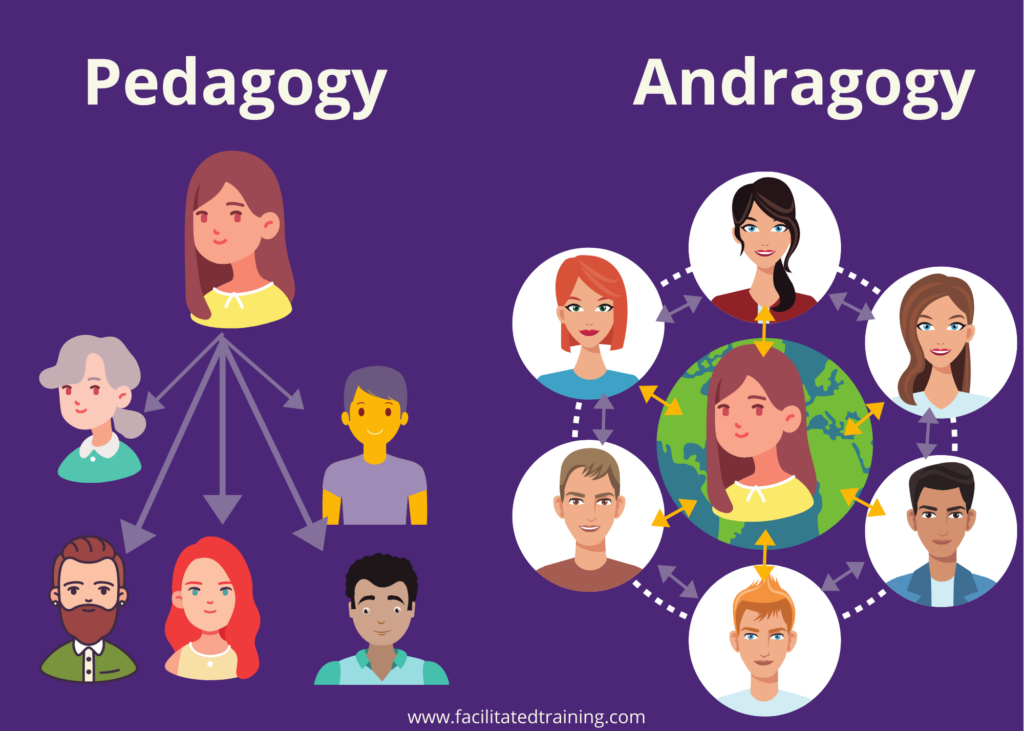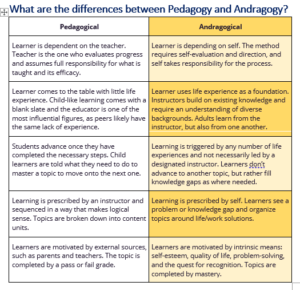According to L&D expert Colleen Condon, “Learner motivation is key when it comes to Adults. Without engagement, and buy in, learning is unlikely to occur, regardless of topic, or importance.”
So, how can Learning and Development teams hope to design effective training programs if they aren’t aware of the mental forces that drive learning?
The short answer is, they can’t.
Learning theories are attempts to model out the ‘mental involvement’ that enables learning. Philosophers, scientists, and psychologists have been trying to untangle exactly how we learn for some time now. Although no one theory reigns supreme, some frameworks stand out more than others.
In this article, we’ll review Adult Learning theory (Andragogy) and suggest how L&D teams might apply them for better learning outcomes:
Adult Learning Theory (Andragogy)
Believe it or not, before the Second World War, theorists were almost exclusively concerned with studying the way children learned. None had given any significant thought to whether the process in adults was any different. Then came our hero, Malcolm Knowles.
Knowles is credited with formulating the theory of ‘andragogy’ (adult learning theory) in the U.S. in the 1980s. He specifically sought to untangle the differences in how adults learn, versus how children do. He adapted the pedagogical model to accommodate major differences in motivation, process, and style.
The major points of his theory are based on 6 assumptions about how adults learn:
- The need to know: Adults crave to understand why they’re learning something.
- Learner’s self-concept: In a learning situation, adults need to be treated as adults, with pre-existing knowledge, experience, and points of view.
- The role of learner’s experiences: Adults’ varied experiences mean they can more actively participate in a learning process than children (who lack that life experience).
- Readiness to learn: Adults should enter learning situations when it makes sense in their career, life circumstances, or life goals.
- Orientation to learning: For adults, learning courses should be grounded in real-world context, not abstract ‘learning for learning’s sake’.
- Motivation: Adults are primarily driven by internal factors, like a desire for higher self-esteem.
All this would seem to make a world of sense. But pedagogical models, where the instructor is the authority figure and where learning is ‘poured into the heads of students’, is more prevalent than one would think—even in L&D settings. How can learning and development teams respect the principles of adult learning theory in their training?
Let’s start by comparing Pedagogy and Andragogy models.
To recap, andragogy refers to the methods and approaches used in adult education and is directed towards self-actualization, gaining experience, and problem-solving.
In contrast, pedagogy is an education method in which the learner is dependent on the teacher for guidance, evaluation, and acquisition of knowledge. The problem? Someone applying pedagogical theory to a classroom full of professionals might find that their efforts read as child’s play.
HOW TO APPLY ADULT LEARNING THEORY
Adult learning theory insists that the (adult) learner needs to be in the driver’s seat more often than not.
- Use a bottom-up approach to training needs analysis. Instead of relying on top management to determine learning needs, let employees lead the way.
- Let adults share their experiences. Your learners are rich with prior experience and knowledge. Let them be the subject-matter experts in the areas they know about and engage in some peer learning.
- Opt for self-directed learning. Lesson planning, researching, independent study…L&D teams act more as facilitators than all-knowing instructors in this set-up. Learners self-direct when possible.
Of course, whenever you learn anything, there’s always going to be some trial and error. Even if you embrace adult learning theory, it will take some time before learners truly get the hang of new material.
It may seem like semantics but understanding the differences between pedagogy and andragogy could make a big difference between lackluster learning and ready, engaged adults. This doesn’t mean that children and adults always learn differently (both, for example, have a positive response to animation). The fact is, adults come to the table with different motivators. They know what has worked in the past or have habits that affect the way they learn and receive new information. Because of this, approaching new topics with a traditional pedagogical strategy could leave them disengaged and uninterested.
Andragogy inspires instructors to do a better job connecting learning experiences to what adult learners already know. Allowing for opinion, better pacing, and knowledge checks and re-checks, help adults leverage what they already know against the new topics they are presented with. Think of it as one of the fringe benefits of teaching adults: Andragogy leaves room for a lifetime of learning.
- Knowles, M. S. (1950) Informal Adult Education, New York: Association Press. Guide for educators based on the writer’s experience as a programme organizer in the YMCA.
- Knowles, M. S. (1962) A History of the Adult Education Movement in the USA, New York: Krieger. A revised edition was published in 1977.
- Knowles, M. (1975). Self-Directed Learning. Chicago: Follet.
- Knowles, M. (1984). The Adult Learner: A Neglected Species (3rd Ed.). Houston, TX: Gulf Publishing.
Facilitated Training has other great references and tools for Learning professionals.
Facilitated Training has the solution that you need. Editable training materials that can be used again and again. Insert your company logo, add in case studies or examples from your workplace, or train using the quality training materials, as is.
Facilitated Training is your one-stop-shop for world-class, customisable training and professional development resources.
Facilitated Training offers training and organisational development resources to facilitators, trainers, coaches, HR managers and individuals.
Specialising in customisable leadership and management skills, Facilitated Training features a wide variety of products, including Training resources, Professional development courses, assessments, ebooks, videos and more.
Click here for customisable training materials that will assist your workplace in managing resources and output.
www.facilitatedtraining.com
About Facilitated Training’s founder and Chief Learning Officer: Colleen Condon
Colleen Condon is one of Asia Pac’s most well-rounded Organisational and Learning professionals. With her finger in every piece of the Human Resources pie, Colleen has trained 1000s of people across multiple industries and countries. She has conducted training department reviews in Soul, facilitated regional planning programs in Mumbai, deployed leadership programs across Australia, Singapore and New Zealand, to name a few.
She has developed targeted training materials for the likes of Westpac Bank, Bank of Melbourne, Sodexo, Repco and CGU Insurance. Along the way, she has written books for learning and development professionals, implemented regional online induction programs for 14 countries, and most importantly, wielded Flipchart Markers like no one else on Earth.
Colleen commenced her Learning and Development career, along the way she supplemented her practical know-how with a Grad Dip, Vocational Training (Melbourne University 1996) and Masters Educational Leadership (RMIT 2001). Her passion for the ongoing development of herself and others has included accreditation’s in Cultural Orientation Indicator (2015), People Centre Implementation (PCI) 2001, Human Synergistics, Life Style Inventory, and Myers Briggs Indicator Step ii (2004).
Most recently, Colleen was a Director of Learning Development, Asia Pacific, overseeing the development of 64,000 employees.
Her global and regional responsibilities honed her ability to work and create training materials that are adaptable across industry and culture.
But she is not done yet.
Colleen’s passion is to bring engaging and lively adult centred learning to the workplace. Relevant, gamified, outcome-focused Colleen, and her team have created a range of resources that are ready to use. All of the hard work has been done, leaving you to be able to focus on getting on and developing your people.




